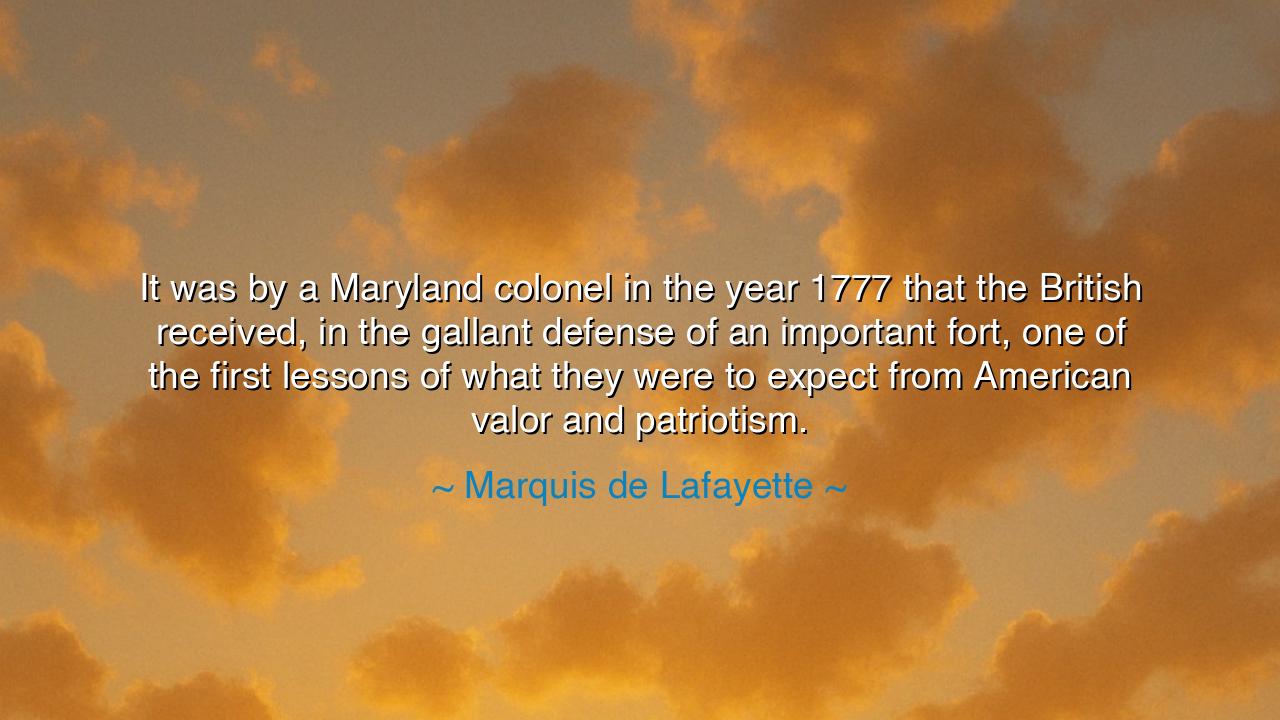
It was by a Maryland colonel in the year 1777 that the British
It was by a Maryland colonel in the year 1777 that the British received, in the gallant defense of an important fort, one of the first lessons of what they were to expect from American valor and patriotism.






The illustrious Marquis de Lafayette, witness to the birth of a nation, once recalled: “It was by a Maryland colonel in the year 1777 that the British received, in the gallant defense of an important fort, one of the first lessons of what they were to expect from American valor and patriotism.” In these words lies the thunder of early American courage and the dawn of a people who understood that valor and patriotism are inseparable in the defense of liberty. Lafayette’s observation is not merely historical; it is a testament to the power of individual and collective courage to shape the destiny of a nation.
In the eyes of the ancients, courage was the bedrock of citizenship. Plato and Aristotle spoke of the warrior’s virtue not as mere strength of arms, but as devotion to justice, to community, and to the ideals that sustain the polis. Lafayette’s Maryland colonel embodied this teaching, standing resolute at a fort against a formidable enemy. His patriotism was a living force, inspiring those around him and signaling to the world that the fledgling nation would defend its liberty with unwavering resolve.
The event Lafayette commemorates refers to the defense of Fort Mifflin during the Revolutionary War, where Colonel William Smith and his men held off British forces on the Delaware River. Against overwhelming odds, their determination delayed the enemy and safeguarded the Continental Army, buying precious time for the revolution to endure. This gallant act demonstrated that American valor was not measured solely in numbers or resources, but in the courage, discipline, and conviction of those who would sacrifice everything for their homeland.
The meaning of Lafayette’s reflection extends beyond the battlefield. Patriotism, in its highest form, is an active engagement with the responsibilities of citizenship. It is not mere sentiment, nor empty allegiance; it is the willingness to act decisively in defense of shared values, even when the cost is great. The Maryland colonel’s heroism exemplifies the principle that liberty is safeguarded not by rhetoric alone, but by those who are willing to embody their love of country through courage and sacrifice.
History offers other resonant examples. Consider the stand of the Minutemen at the Battle of Lexington and Concord in 1775. Ordinary farmers, tradesmen, and citizens, faced with the march of imperial forces, took up arms with determination and honor. Their valor and patriotism signaled that the American cause was no fleeting rebellion, but a deeply rooted commitment to freedom and self-determination. Like Lafayette’s Maryland colonel, they showed that true courage is often found in ordinary men and women rising to extraordinary challenges.
Lafayette’s words also illuminate a timeless moral truth: acts of patriotism are both instructive and inspiring. The British, confronted with the steadfast defense of a single fort, learned that American courage could not be measured in conventional terms. Likewise, societies across history have observed that valor and patriotism, expressed in defense of justice and liberty, often shape destinies and alter the course of nations. These are lessons for all who seek to understand the weight of individual and collective duty.
The lesson for generations yet unborn is clear: patriotism is inseparable from courage, and valor is the living expression of love for one’s country. One must act, even in the face of fear, to uphold the principles that define a nation. To praise liberty while avoiding responsibility is hollow; to stand resolute, even in solitude or danger, is to honor it truly. The Maryland colonel’s deeds are a beacon, reminding us that patriotism is not passive—it is forged in action, trial, and sacrifice.
Practically, this teaching calls citizens to cultivate courage, integrity, and commitment. Serve your community, defend justice, and uphold the principles upon which your society is built. Recognize that every act of diligence, honesty, and service is a modern expression of valor and patriotism. In doing so, you honor the legacy of those who defended the nation in its earliest hours, ensuring that their courage continues to guide and inspire generations to come.






AAdministratorAdministrator
Welcome, honored guests. Please leave a comment, we will respond soon